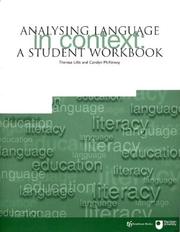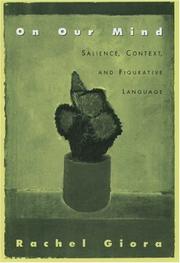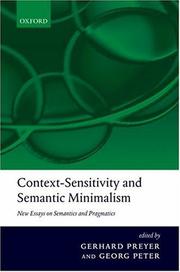| Listing 1 - 10 of 42 | << page >> |
Sort by
|
Book
ISBN: 9781623563059 1623563054 1474269788 1474295347 1623563011 162356235X Year: 2014 Volume: 3 Publisher: London, UK: Bloomsbury academic,
Abstract | Keywords | Export | Availability | Bookmark
 Loading...
Loading...Choose an application
- Reference Manager
- EndNote
- RefWorks (Direct export to RefWorks)
Context (Linguistics). --- Discourse analysis. --- Context (Linguistics) --- Discourse analysis

ISBN: 9781858562872 1858562872 Year: 2003 Publisher: Stoke-on-Trent: Trentham Books,
Abstract | Keywords | Export | Availability | Bookmark
 Loading...
Loading...Choose an application
- Reference Manager
- EndNote
- RefWorks (Direct export to RefWorks)
Book
ISBN: 9781138818392 9781315745275 9781317594673 1138818399 Year: 2017 Publisher: New York (N.Y.): Routledge,
Abstract | Keywords | Export | Availability | Bookmark
 Loading...
Loading...Choose an application
- Reference Manager
- EndNote
- RefWorks (Direct export to RefWorks)
Epistemic contextualism is a recent and hotly debated topic in philosophy. Contextualists argue that the language we use to attribute knowledge can only be properly understood relative to a specified context. How much can our knowledge depend on context? Is there a limit, and if so, where does it lie? What is the relationship between epistemic contextualism and fundamental topics in philosophy such as objectivity, truth, and relativism? The Routledge Handbook of Epistemic Contextualism is an outstanding reference source to the key topics, problems, and debates in this exciting subject and is the first collection of its kind. Comprising thirty-seven chapters by a team of international contributors the Handbook is divided into eight parts: Data and motivations for contextualism, Methodological issues, Epistemological implications, Doing without contextualism, Relativism and disagreement, Semantic implementations, Contextualism outside ‘knows’, Foundational linguistic issues. Within these sections central issues, debates and problems are examined, including contextualism and thought experiments and paradoxes such as the Gettier problem and the lottery paradox; semantics and pragmatics; the relationship between contextualism, relativism, and disagreement; and contextualism about related topics like ethical judgments and modality. The Routledge Handbook of Epistemic Contextualism is essential reading for students and researchers in epistemology and philosophy of language. It will also be very useful for those in related fields such as linguistics and philosophy of mind.
Contextualism (Philosophy) --- Knowledge, Theory of --- Context (Linguistics)

ISBN: 0195136160 9780195136166 Year: 2003 Publisher: New York: Oxford university press,
Abstract | Keywords | Export | Availability | Bookmark
 Loading...
Loading...Choose an application
- Reference Manager
- EndNote
- RefWorks (Direct export to RefWorks)
Psycholinguistics --- Figures of speech --- Context (Linguistics)
Periodical
ISSN: 13499726 Year: 2006 Publisher: Nagoya: Nagoya university. Graduate school of letters,
Abstract | Keywords | Export | Availability | Bookmark
 Loading...
Loading...Choose an application
- Reference Manager
- EndNote
- RefWorks (Direct export to RefWorks)
Book
ISBN: 9780415651448 0415651441 Year: 2004 Publisher: London: Lawrence Erlbaum,
Abstract | Keywords | Export | Availability | Bookmark
 Loading...
Loading...Choose an application
- Reference Manager
- EndNote
- RefWorks (Direct export to RefWorks)
Typology (Linguistics) --- Context (Linguistics) --- Discourse analysis, Narrative
Book
ISBN: 9782760640931 2760640930 Year: 2019 Publisher: Montréal: Presses de l'Université de Montréal,
Abstract | Keywords | Export | Availability | Bookmark
 Loading...
Loading...Choose an application
- Reference Manager
- EndNote
- RefWorks (Direct export to RefWorks)
"Derrida à Montréal n'est pas le titre d'une pièce de théâtre, mais celui d'un essai qui suit, en trois actes, trois événements singuliers qui ont eu lieu à Montréal et auxquels Jacques Derrida a participé en 1971, en 1979 et en 1997. Au "Premier Acte", Michael Naas relit de près la première communication du philosophe, "Signature événement contexte", un texte qui prend très au sérieux - et les critique tout à la fois - la théorie des speech acts de John L. Austin et les questions du contexte, de la présence, de l'écriture, de l'événement et de la signature qui lui sont liées. Au "Deuxième Acte", on retrouve Derrida traitant de ces mêmes questions, mais d'un point de vue politique où il s'intéresse aux "Déclarations d'Indépendance". Enfin, au "Troisième Acte", Derrida poursuit cette discussion ininterrompue qui se concentre, une fois de plus, sur ces mêmes aspects, mais à la lumière de la notion d'événement. C'est comme si Montréal avait chaque fois été la scène rêvée où Derrida avait pu explorer ces questions pour lui cruciales."--Page 4 de la couverture.
Speech acts (Linguistics) --- Context (Linguistics) --- Events (Philosophy) --- Derrida, Jacques
Book
ISBN: 9789519040349 951904034X Year: 2009 Volume: 78 Publisher: Helsinki: Société néophilologique,
Abstract | Keywords | Export | Availability | Bookmark
 Loading...
Loading...Choose an application
- Reference Manager
- EndNote
- RefWorks (Direct export to RefWorks)
Linguistics --- Semantics --- Context (Linguistics) --- Context (Linguistics). --- Discourse analysis. --- Linguistics. --- Linguistik. --- Semantics. --- Semantik --- Språkvetenskap --- Französisch. --- Linguistics - Congresses. --- Semantics - Congresses.

ISBN: 9780199213320 9780199213313 0199213313 0199213321 Year: 2007 Publisher: Oxford: Oxford university press,
Abstract | Keywords | Export | Availability | Bookmark
 Loading...
Loading...Choose an application
- Reference Manager
- EndNote
- RefWorks (Direct export to RefWorks)
Lexicology. Semantics --- Pragmatics --- Semantics. --- Minimalist theory (Linguistics) --- Context (Linguistics) --- Context (linguïstiek). --- Minimalist theory (linguïstiek). --- Pragmatiek. --- Semantiek.
Book
ISBN: 9782870378519 2870378513 Year: 2014 Volume: 6 Publisher: Namur: Presses universitaires de Namur,
Abstract | Keywords | Export | Availability | Bookmark
 Loading...
Loading...Choose an application
- Reference Manager
- EndNote
- RefWorks (Direct export to RefWorks)
Multilingualism --- Multilinguisme --- Plurilinguisme --- Trilinguisme --- Veeltaligheid --- French language --- Study and teaching --- Context (Linguistics)
| Listing 1 - 10 of 42 | << page >> |
Sort by
|

 Search
Search Feedback
Feedback About UniCat
About UniCat  Help
Help News
News